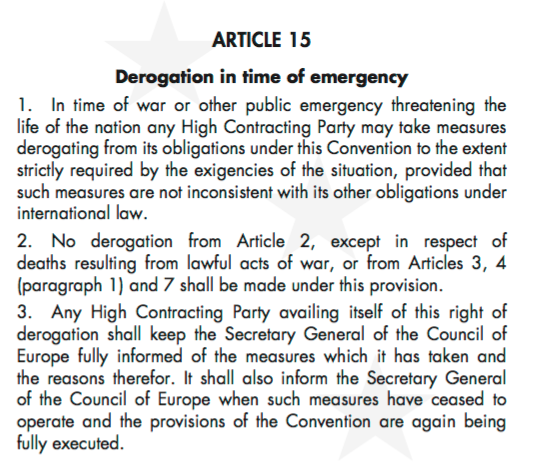Turkish officials have announced that Turkey will ‘derogate from’ the European Convention on Human Rights after announcing a state of emergency following a recent failed coup attempt.The effect will be that many of the rights in the Convention will be suspended.
For several hours on the night of Friday 15 July, hundreds of Turkish soldiers appeared to have taken control of key areas in Turkish cities of Ankara and Istanbul in an attempt to overthrow the country’s current leadership. The coup attempt failed. President Recep Erdogan called it “an act of treason and rebellion“.
On Thursday 21 July, Turkey’s Deputy Prime Minister, Numan Kurtulmus, said that Turkey would derogate from the European Convention on Human Rights, following the example set by France when it temporarily derogated from the Convention after last November’s attacks by ISIS militants in isis. He said “The state of emergency in Turkey won’t include restrictions on movement, gatherings and free press, etc. It isn’t martial law of 1990s”. The Council of Europe, which monitors compliance with the Convention, has been formally notified of Turkey’s intentions.
What does ‘derogation’ mean?
Derogation from the European Convention on Human Rights is allowed only in limited circumstances defined by Article 15 of the Convention. It means that a State’s obligation to secure human rights under the Convention will be temporarily suspended and certain human rights will not apply for a limited period.
The right to derogate can only be invoked in times of war or other public emergency threatening the life of the nation. Here is Article 15:

Does this mean all human rights are suspended in Turkey?
No – States can only derogate from certain rights. For example, they cannot derogate from Article 2 (the right to life), Article 3 (the prohibition on torture and inhuman or degrading treatment or punishment), Article 4, paragraph 1 (the prohibition of slavery) and Article 7 (no punishment without law), Article 1 of Protocol No. 6 (abolishing the death penalty in peacetime) to the Convention, Article 1 of Protocol No. 13 (abolishing the death penalty in all circumstances). These are known as ‘non-derogable rights’.
A State may take measures derogating from its Convention obligations only to the extent strictly necessary in the situation.
Has this happened before?
Yes. In 1996 the Turkish government derogated from the Convention because of terrorism in South Eastern Turkey by a group called the PKK. A number of cases were brought against Turkey in the European Court of Human Rights by people who had been detained without judicial supervision for long periods and mistreated. In one case, Turkey was found to have detained a man for 18 days without access to a judge which could not be justified by the state of emergency. See more in this factsheet.
How common is it for States to derogate from the Convention?
Eight states have previously relied on the right to derogate from the European Convention on Human Rights, including the UK which derogated from the Convention during the unrest in Northern Ireland and after the 11 September 2001 terrorist attacks. Most recently, in November 2015, France derogated from the Convention following the Paris terrorist attacks. A full list of derogations is here.
Can derogating from the Convention be challenged?
The justification for, and application of, a derogation can be challenged in the European Court of Human Rights on a case by case basis – see the cases involving Turkey referred to above.
More information on the right of States to derogate from the European Convention on Human Rights is available in this helpful factsheet. You can learn more about the European Convention on Human Rights with our explainer.
Subscribe to RightsInfo and follow us on Facebook and Twitter for more human rights news, views and information.







